- Home
- Isaac Hooke
Test of Mettle (A Captain's Crucible Book 2) Page 26
Test of Mettle (A Captain's Crucible Book 2) Read online
Page 26
Jonathan glanced at Robert. “Now we’ll see if the structural engineers did their jobs properly.”
If they did not, the Callaway would be shortly ripped apart.
“The pursuers are braking, too,” Ensign Lewis said. “They’re turning away at a thirty degree angle.”
“Return to previous speed,” Jonathan said. “And turn the fleet thirty degrees in the opposite direction. It’s obvious they’ve had their noses bloodied enough for the day.”
“We’re letting them go?” Robert asked.
“I’ve had enough for today, too,” Jonathan said. “I don’t want to lose any more ships.”
“It took our enemy a while before coming to the same conclusion,” Robert said.
Jonathan watched the pyramid and dart ships continue their breakaway course. They were accelerating past escape velocity, slowly deorbiting, likely intending to rejoin ETU-F1 and the survivor from ETU-F2.
“Should we rendezvous with the two defector ships?” Robert asked. “They’re heading is not far off from our own.”
“We’ll keep our distance for now,” Jonathan said. “We still don’t know their full intentions.”
thirty-seven
Bridgette sat in the dreary compartment with its empty operating tables and robotic arms dangling from the ceiling. At first those arms had shadowed her every movement from above, but they had moved off to one corner hours ago as if they had lost interest.
The place was lit by those glowing filaments set into the bulkheads, though the glow had switched from blue to red many hours ago. She wasn’t entirely sure what that meant, though she suspected it had something to do with the combat readiness of the alien vessel, sort of like general quarters on a human ship.
She still wore her spacesuit. She had already swapped out her oxygen tank once, and the O2 level of the latest canister was at fifty percent. She also gripped the darkness generator, never letting it go, just like Barrick had told her to do. Unfortunately, the past twelve hours had seemed like twenty four, thanks to the time dilation the device caused.
She had programmed her glove to remain shut around the device regardless of finger pressure, so at least she had been able to take random naps. She had also tried to immerse herself in a few virtual reality experiences to pass the time, but she couldn’t concentrate and usually shut them down after five minutes or so. Mostly, she alternated between staring at the glowing filaments set into the bulkheads and watching the time tick past at a crawl on her faceplate. She tried talking softly to Eugene once but quickly stopped, feeling too guilty about what she had almost done to the baby.
0700 finally arrived.
Yellow fumes rushed into the compartment from the direction of the entrance and she realized both hatches of the airlock had opened.
Right on schedule.
She scrambled to her feet.
But then a dark mist rolled inside. She quickly dove behind one of the empty operating tables and hoped the Raakarr hadn’t seen her.
Several nerve-racking seconds passed.
And then the alien waltzed right past her.
She knew there had to be some kind of monitoring system in place in that compartment, but she suspected that whoever had opened the hatches was helping her in other ways, such as hiding her location from the system, and disabling the robot arms on the ceiling. She hoped so, anyway.
She peered past the edge of the operating table. The dark mist continued moving away from her, deeper into the compartment.
She quietly scrambled to her feet and made her way to the entrance. She wasn’t sure if the aliens could sense sound, but she placed her boots as softly as possible anyway, and hoped the darkness shield further muted each step. She glanced nervously at the ceiling: the robot arms didn’t move from where they dangled.
She reached the airlock and carefully gazed past the rim. There was no sign of the second guard that had escorted her to the compartment so she hurried into the tight passageway beyond.
Before she rounded a bend in the passage she glanced over her shoulder. There was no sign of pursuit.
The floral-like filaments that lined the bulkheads continued to glow red, lighting the way. She was glad for that, because she wasn’t sure her helmet lamp could penetrate the darkness shield. She hadn’t tried the lamp, of course. She hadn’t dared.
She retraced her steps, following the map she had recorded on her aReal. She glanced at the current time. 0708. Barrick’s words returned to the forefront of her thoughts. No matter what happens, you must be off the ship by 0730.
She came across several sealed hatches along the way, but always the doors slid open at her approach. Those hatches hadn’t been closed during her previous journey through the passages, confirming her suspicions that the ship was running under the alien equivalent of Condition Zebra, whereby the hatches were sealed to prevent a ship-wide decompression in the case of a breach scenario. On a human ship, she would have had to inform the Damage Control spaces of her planned route beforehand, and she’d have to override each hatch individually. Either someone was doing that for her at the moment, or the darkness generator she held automatically transmitted the necessary codes. Or maybe the seals always opened whenever a Raakarr approached—she really couldn’t know.
The passageway shuddered from time to time but she had gotten used to those occasional vibrations. She wasn’t sure what caused them. Perhaps the vessel was swinging by a gravity well. Either that, or it was taking fire of some sort.
She came across the black fog of another Raakarr along the way and she ducked into a side passage to avoid it. But the mist only followed her; she increased her pace and took several random turns, eventually eluding the pursuer. The map allowed her to find her way back to the main passage and she proceeded onward.
By the time she reached the hangar bay the time read 0727. Three minutes to go.
Unfortunately, another mist-clad alien stood guard directly in front of the entrance.
She approached and the black fog surprisingly rolled to one side to let her pass. She slowly edged by, expecting a claw or mandible to dart out from the darkness and grab her at any moment. But incredibly the alien did nothing. She wondered if it believed she was one of them.
She hurried into the bay and transmitted the access codes to the Dragonfly. The rear ramp lowered and she rushed in. She set aside the darkness generator, strapped herself into the cockpit, and then sealed the ramp and turned on the engines. She was just wondering how she was going to fly through the bay doors when the pair magically opened of their own accord.
She silently thanked Barrick or whoever was helping her and then activated the shuttle’s training AI. With its assistance she hovered the Dragonfly into the air and accelerated through the bay doors.
She was entirely unprepared for what awaited out there.
A FLASH APPEARED on the external video feed Jonathan was monitoring on his aReal.
“Captain,” Lewis said. “T300 just broke apart.”
“What do you mean it broke apart?” he growled.
Robert remained completely motionless beside him.
“I think... I think its structural integrity was compromised when the pyramid ship fired at it,” Lewis said. “I’m sorry sir.” She paused. “I am detecting two smaller signatures, however. The alien equivalent of lifepods, maybe.”
“Lifepods?” Robert said.
Jonathan glanced at the commander. The first officer’s eyes flashed with hope.
“It’s possible their lifepods are better equipped to deal with the conditions out there than our own,” the ensign said. “Their heat armor seems to be holding up. So far.”
Jonathan studied the display. The two objects appeared as faint red dots.
“The remaining defector is moving to intercept one of the objects,” the ensign continued. “The other object, meanwhile, is on a parallel trajectory to our own fleet, though in a lower orbit.”
“What if it’s Bridgette?” Robert said urgently.
>
“Can we tell if it’s a Dragonfly?” Jonathan asked the ensign.
Lewis shook her head. “It’s too far, and too small. The external temperature is obscuring the heat signature. And the radiation interference isn’t helping matters.”
“Lazur, try to hail it,” Jonathan said.
Lazur shook his head. “Too far. If it is a Dragonfly, it might be receiving our weak signal, but at that range its comm node would be too small to punch through the interference for a reply.”
“Keep trying,” Jonathan told the comm officer.
“It has to be her,” Robert said.
“Nav, plot a course to that unidentified object,” Jonathan said. “Miko, kindly inform the fleet that the Callaway is taking a short dive. Everyone else is to remain in the current orbit. The Dagger is in command.”
“Intercept course plotted,” the nav specialist said a few moments later.
“Helm, take us down.”
“Decelerating,” the helmsman answered. “And firing appropriate thrusters to achieve the new vector.”
“Sir,” Lazur said. “Captain Rail of the Salvador insists on speaking with you.”
“Put her on,” Jonathan sighed.
Her holographic image appeared at the center of the Round Table, where she seemed to be seated.
“What is it, Captain?” Jonathan said.
“I insist that you allow the Salvador to escort you,” Rail said. “If the enemy spies a lone ship diving away from the others, they might decide to turn back and pick that ship off.”
Jonathan considered her offer. “Actually, we could use you. Go ahead and join us.”
She seemed stunned. Then: “Thank you, Captain.”
Jonathan nodded stiffly. “While we come alongside it, I want you to assume a position underneath the object. Shade it from the subgiant’s heat. If it’s the Dragonfly we’re looking for, I have a feeling the thermal shields are being strained to the limit right about now.”
“Understood. Captain Rail out.” Her hologram vanished.
On the tactical display, as the two ships moved away from the fleet, the CDC assigned the labels TU1 and TU2 to the separate portions of the task group, with the Callaway and the Salvador becoming Task Unit One.
“We’re on the same plane as the object,” the helmsman said after several minutes. “Firing stabilizing thrusters, and accelerating toward its position.”
The bridge began shaking anew. Slowly but surely, the vessel began to move toward the object.
The helmsman glanced at Jonathan. “The Captain is aware that the object is on a decaying orbit?”
“No I was not,” Jonathan said. That meant the Callaway was on a decaying orbit, too.
Jonathan accessed the fuel indicators on his HUD. The inert gas levels were dropping fast, thanks to the immense Delta V costs there. Geronium was also being used at an extremely high rate. According to the current estimates, when the human fleet finally broke free of the suns, the constituent vessels would have exhausted roughly ninety percent of their propellant and seventy percent of their geronium, with the Callaway and Salvador faring the worst. The first order of business after the battle concluded was to dispatch the Harvester vessel to one of the gas giants in order to collect both fuels.
He glanced at the unidentified object. If that really was a Dragonfly, it definitely wouldn’t have enough propellant to reach the fleet on its own.
“The second object was just captured by the defector,” Lewis announced. “It looks like they used some sort of grappling hooks.”
“We need to get ourselves some of those,” Jonathan muttered. While Dragonflies and Avengers could fire grappling hooks, the warships in the fleet had no such capability. Tow lines could of course be attached to any starship, again with the help of shuttles, but those took time to deploy. If the unidentified object wasn’t grappling-capable, the Callaway would have to come up with an alternate retrieval plan, one that would be made all the more difficult by their current environment.
The comm officer spoke up a moment later. “The alien ship is hailing us.”
“Now they want to talk peace again,” Jonathan said. “Wait a second, which alien ship?”
“The defector,” Lazur replied. “It’s Barrick. Apparently he was aboard whatever lifepod the ship captured. He says the Zarafa faction is in control of the vessel, and the aliens are requesting permission to join our fleet.”
Jonathan glanced at Robert. “So the faction exists after all.”
“Maybe,” the commander said. “But even so, they only helped us when it became clear we were going to win.”
“Wouldn’t you do the same?” Jonathan told him. “Why reveal your hand unless there was a high chance the cards would lead to victory?”
“But their behavior goes against your strategy of playing to win,” Robert said. “Because what they did was definitely playing not to lose.”
“That’s because they don’t know how to play the game properly,” Jonathan said. “In any case, their actions have now given us the advantage. They’re in our debt, and require our protection going forward. Their ship can never again fight with the Raakarr. Future negotiations between us will go much more smoothly, I think.” He turned toward Lazur. “Are you able to tap in to the unidentified craft yet?”
“Negative,” Lazur answered.
Jonathan had hoped the craft was within communication range as well by then, but obviously the Raakarr vessel had a far more powerful comm node equivalent.
“All right.” He sighed. “Tell Barrick we’ll allow them to fly no closer than thirty thousand kilometers from Task Unit Two. Instruct the Dagger to expect a visitor. Eventually.”
The comm officer nodded. A moment later: “Barrick says they agree.”
“Let me talk to him,” Jonathan said.
Barrick’s voice came over the comm a moment later. “Hello Captain.” The telepath was difficult to understand thanks to the digital warping caused by the radiation.
“Tell me Bridgette was aboard the lifepod with you,” Jonathan said.
“I’m sorry, Captain,” Barrick replied. “I took the leader of the Zarafa faction with me, not the commander’s wife. There wasn’t room.”
Robert slumped visibly beside him.
“But she did escape the destruction,” Barrick continued. “Thanks to the Zarafa leader’s help—part of his show of good faith. You are tracking an unidentified object, aren’t you?”
Lewis glanced up urgently. “Captain. I can confirm, that’s definitely one of our Dragonflies out there.”
thirty-eight
Lieutenant Lin Akido floated, disembodied, above the hull of the Salvador. Well, she wasn’t quite disembodied—looking down, she could discern the ghostly outline of her bodysuit. And though she couldn’t see it, she resided in an Avenger attached to the port-side Whittle layer of the warship via magnetic mounts and grappling hooks. She hung upside-down so that the heat shields of the fighter faced outward. Those shields had seen little use—the warship’s entire port-side currently faced away from the subgiant, and for all the Salvador’s frantic and evasive maneuvering, the destroyer had only turned that particular side to the sun once. During that short time the Avenger’s heat shields had held up, of course, and the anti-rad subdermals had kicked in when the radiation spiked.
She felt quite useless. Two days she had been out there. Two useless days of sitting around, waiting for action. Fighter pilots were trained to have the same patience and discipline as snipers, with the expectation that sometimes missions could last weeks on end. There were more than a few elite units that specialized in sneaking unnoticed behind enemy lines to assassinate an SK traveling in a business shuttle, for example.
She had survived on liquid sustenance via a straw in her helmet, and relieved herself by means of the cup strapped over her groin. A fecal collector protruded from the rear of her bodysuit. Electrodes in the suit stimulated her muscles to contract at different points throughout the day. Those elect
rodes weren’t inducing any contractions at the moment, but even so her right calf spasmed annoyingly—one of the unwanted side effects that came from hours of involuntary flexing.
She sensed her copilot shifting beside her.
“You know,” Lieutenant Grisham’s disembodied voice said. “I don’t see why the commander didn’t just let us operate the fighters remotely, if they had known we’d be operating so close to the hull the whole time.”
“We volunteered for this, Gris,” Lin said.
“True enough. But you know I’d go anywhere for you, babe.”
He was joking, of course. The repartee shared between warriors. Still, she was accustomed to sexual harassment in the navy. And while what he said didn’t qualify, it was close. The unwanted advances and remarks had lessened as she rose through the ranks. It was the worst when Lin first signed up. The navy frowned on such behavior, and so at the time she took it upon herself to show every incident of harassment to her superior officers, as recorded by her aReal. The men in question would be disciplined, but it made working with them a whole lot harder. She learned it was best to suck it up, and never lead them on.
Unless you wanted something more.
She thought of Wolf. She never meant things to go as far as they had. It was just sex, at first. And that was all she wanted, and Wolf seemed to want the same. But after they escaped from the alien ship, their relationship had subtly changed. The lovemaking was just as wild as ever, but it had a note of desperation to it, not just for him, but for her, as if both of them were suddenly all too aware how temporal their relationship was. Wolf had begun to behave differently outside the sex, too. He seemed more possessive, and was quick to grow jealous if she even looked at another man. She liked it, in a way, but was afraid of the implications.
She had experienced similar issues of jealousy with him. An incident came to mind when he was talking, no, flirting, with a young ensign a few weeks back.

 Warden 2
Warden 2 Devastator
Devastator Warden 4
Warden 4 Emperor
Emperor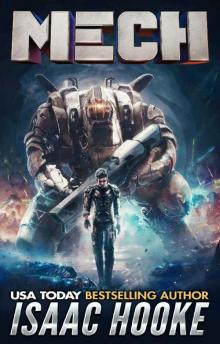 Mech
Mech Conqueror
Conqueror Fighter
Fighter The Forever Gate Ultimate Edition
The Forever Gate Ultimate Edition Defiler
Defiler Mech 2
Mech 2 Warden 3
Warden 3 Warden 1
Warden 1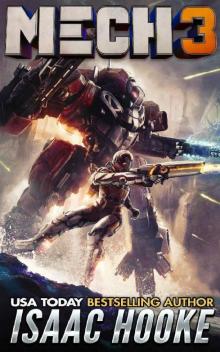 Mech 3
Mech 3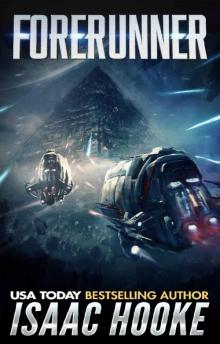 Forerunner
Forerunner The Alliance (AI Empire Book 2)
The Alliance (AI Empire Book 2) Breaker (Monster Tamer Book 1)
Breaker (Monster Tamer Book 1) Bender of Worlds
Bender of Worlds The Pendulum Swings (The Forever Gate Book 8)
The Pendulum Swings (The Forever Gate Book 8) The Link
The Link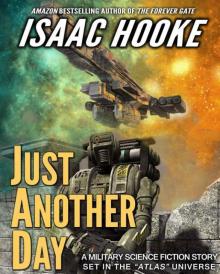 Just Another Day
Just Another Day Star Warrior
Star Warrior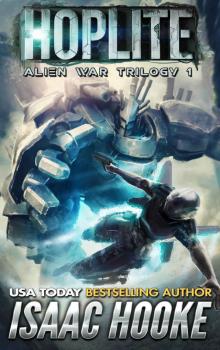 Alien War Trilogy 1: Hoplite
Alien War Trilogy 1: Hoplite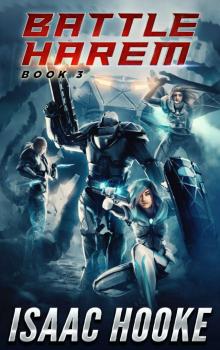 Battle Harem 3
Battle Harem 3 The Ethan Galaal Series: Books 1 - 3
The Ethan Galaal Series: Books 1 - 3 Reloaded
Reloaded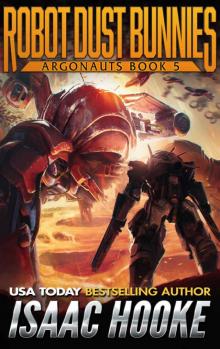 Robot Dust Bunnies (Argonauts Book 5)
Robot Dust Bunnies (Argonauts Book 5) Battle Harem
Battle Harem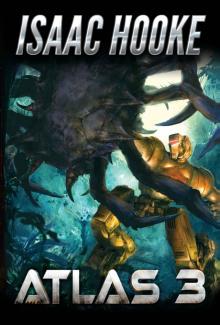 ATLAS 3 (ATLAS Series Book 3)
ATLAS 3 (ATLAS Series Book 3)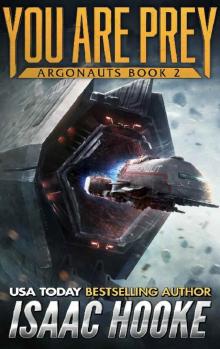 Argonauts 2: You Are Prey
Argonauts 2: You Are Prey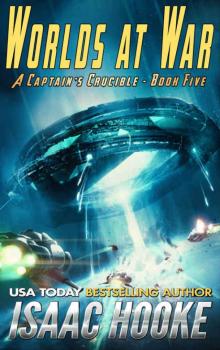 Worlds at War (A Captain's Crucible Book 5)
Worlds at War (A Captain's Crucible Book 5)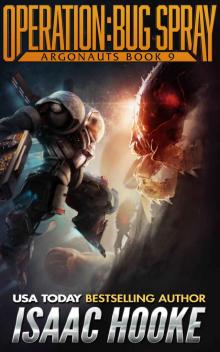 Operation: Bug Spray (Argonauts Book 9)
Operation: Bug Spray (Argonauts Book 9)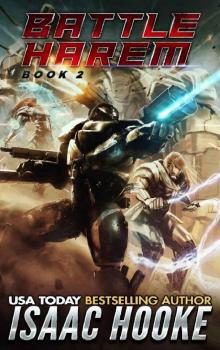 Battle Harem 2
Battle Harem 2 Redeemed (Bolt Eaters Trilogy Book 3)
Redeemed (Bolt Eaters Trilogy Book 3)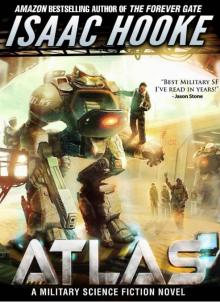 Atlas
Atlas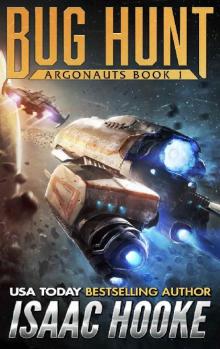 Argonauts 1: Bug Hunt
Argonauts 1: Bug Hunt Reactivated (Bolt Eaters Trilogy Book 1)
Reactivated (Bolt Eaters Trilogy Book 1)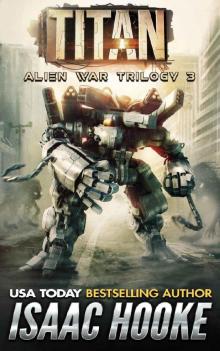 Alien War Trilogy 3: Titan
Alien War Trilogy 3: Titan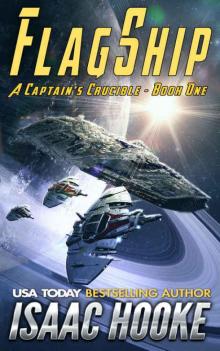 Flagship (A Captain's Crucible #1)
Flagship (A Captain's Crucible #1)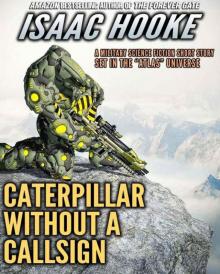 Caterpillar Without A Callsign
Caterpillar Without A Callsign The Forever Gate
The Forever Gate He Who Crosses Death (Star Warrior Quadrilogy Book 3)
He Who Crosses Death (Star Warrior Quadrilogy Book 3) Reforged (Bolt Eaters Trilogy Book 2)
Reforged (Bolt Eaters Trilogy Book 2) Refurbished
Refurbished Reloaded (AI Reborn Trilogy Book 2)
Reloaded (AI Reborn Trilogy Book 2) He Who Crosses Death
He Who Crosses Death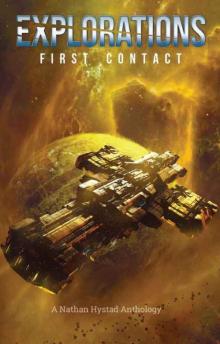 Explorations: First Contact
Explorations: First Contact Planet Killer (A Captain's Crucible Book 4)
Planet Killer (A Captain's Crucible Book 4)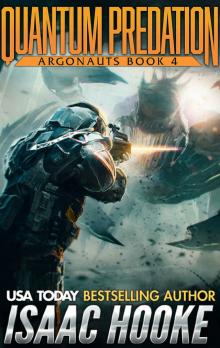 Quantum Predation (Argonauts Book 4)
Quantum Predation (Argonauts Book 4) Clandestine-IsaacHooke-FreeFollowup
Clandestine-IsaacHooke-FreeFollowup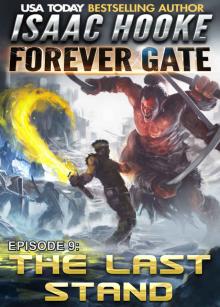 The Last Stand (The Forever Gate Book 9)
The Last Stand (The Forever Gate Book 9)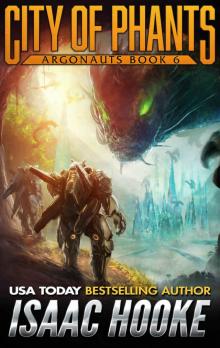 City of Phants (Argonauts Book 6)
City of Phants (Argonauts Book 6)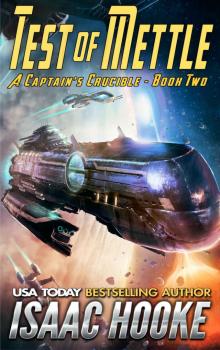 Test of Mettle (A Captain's Crucible Book 2)
Test of Mettle (A Captain's Crucible Book 2)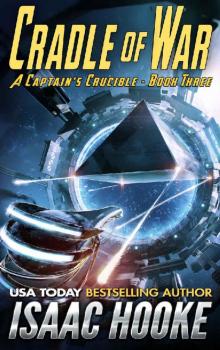 Cradle of War (A Captain's Crucible Book 3)
Cradle of War (A Captain's Crucible Book 3) Rade's Fury (Argonauts Book 7)
Rade's Fury (Argonauts Book 7) Rebirth (The Forever Gate Book 6)
Rebirth (The Forever Gate Book 6) The Forever Gate Compendium Edition
The Forever Gate Compendium Edition Mechs vs. Dinosaurs (Argonauts Book 8)
Mechs vs. Dinosaurs (Argonauts Book 8)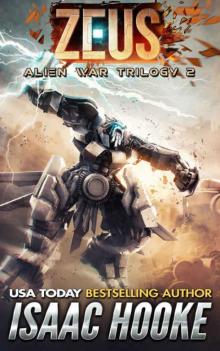 Alien War Trilogy 2: Zeus
Alien War Trilogy 2: Zeus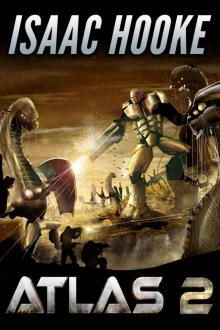 ATLAS 2 (ATLAS Series Book 2)
ATLAS 2 (ATLAS Series Book 2)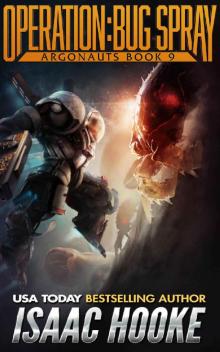 Operation_Bug Spray
Operation_Bug Spray